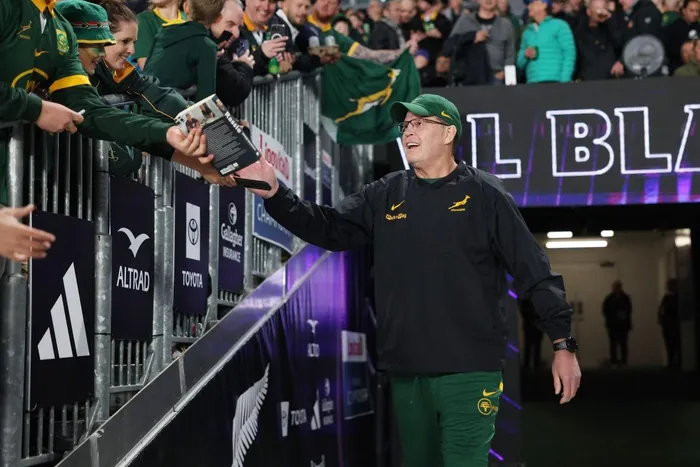
Springboks coach Rassie Erasmus knows injury calamities can happen at World Cups.
Image: AFP
Rassie Erasmus holds a doctorate in Coaching Science, awarded to him by North West University in 2024. It is a lofty title, but not undeserved, because Dr Rassie often dons a philosopher’s cap and discusses "reality" in its various forms.
He has learned the virtue of patience in dealing with Springbok supporters and the media, particularly when it comes to conveying information.
Rassie was headstrong as a younger man but discovered the hard way that being “windgat” (his word to describe his arrogant former self) is counterintuitive. The sheer weight of an uninformed public will always triumph over a smug coach.
The older, wiser Rassie now talks of the “realities” embraced by the opposition as to how a game will unfold, the public’s reality of what they expect, and the reality that holds sway within the Springboks’ camp. What unfolds in a game, he says, is a meeting point between those different realities.
A good example was the build-up to last week’s Springboks versus All Blacks rematch in Wellington.
When Rassie announced on the Monday a side featuring seven changes to the starting line-up and a revamped backline, the public — and probably the New Zealanders too — suspected the Springbok coach had lost the plot and was taking a gamble.
The selection of a brand-new backline suggested Erasmus was making a high-risk, high-reward move. Yet the “gamble” paid off handsomely when the Springboks annihilated the All Blacks. The perplexed Kiwis had no answer as they sank without a trace in the second half, conceding 36 unanswered points on their way to the heaviest defeat in their history.
Here’s the thing: the Springbok players interviewed after the match appeared puzzled when asked about the supposed “gamble” that included Damian Willemse starting at inside centre for the first time, in an untested midfield combination with Canan Moodie.
The best answer to the “gamble” question came from Jesse Kriel a few weeks earlier.
“What the public doesn’t know,” he explained, “is that we practise for every possible match eventuality in our training sessions. Our sessions have the intensity of games; in fact, we try to make them tougher.
“We play against each other at training, and players interchange positions all the time. There will be rotation at practices that sometimes happens in games, but not always.”
In other words, when the coach announces a team that looks radically different from the previous week’s, it is the public’s perception versus that of the players themselves. The latter don’t blink, because they practise different permutations all the time.
Relentless rotation, whether on the training field or in matches, is part of Rassie’s wider plan to take the meanest, most versatile, best-prepared squad the world has seen to the 2027 World Cup in Australia.
Rassie wants a squad of 33 players, each with a minimum of 10 caps — currently, only Ethan Hooker has fewer — and, ideally, all capable of playing more than one position.
He knows injury calamities can happen at World Cups. Probably the best example came in 2011 when New Zealand hosted the tournament.
I was fortunate to be covering that event, and when Dan Carter suffered an early campaign-ending injury, the country was alarmed. That turned to panic as fly-half after fly-half went down injured.
Eventually, in a now-famous story, fifth-choice fly-half Stephen Donald was fishing on the Waikato River when he received a message along the lines of: “Stephen, wherever you are, get to Auckland as soon as possible — you are playing in the World Cup final on Saturday.”
Related Topics: